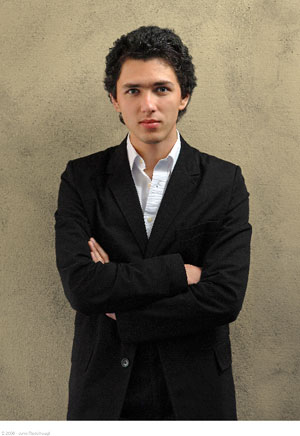
Rising pianist Kunz gives two free recitals
It’s always interesting to see a dustup at a major music competition, when audience and judges disagree, or the judges themselves differ, about the merits of a particular contestant. This kind of thing has gone on for a long time and includes famous examples, such as Ivo Pogorelich’s elimination in 1980 from the third round of the International Chopin Competition, which led to the walkout of judge Martha Argerich.
Earlier this year, the Siberian-born pianist Eduard Kunz was eliminated from the second round of the International Tchaikovsky Competition, despite enormous audience approval and lots of protest from the Russian blogosphere, as the critic Tom Service of England’s “Guardian” wrote at the time.
Kunz, now 31, has been slowly building a strong reputation, winning first prizes at about a dozen major competitions and playing with a raft of leading orchestras, most of them in Europe and his adopted British homeland. The “BBC Music Magazine” named him one of the 10 great pianists of tomorrow, and there are a large number of his performances available on YouTube. Here’s a very fine reading of the Liszt Hungarian Rhapsody No. 12 from 2010 at the New Orleans International Piano Competition, where Kunz took the gold medal.
If you missed Kunz at any one of the big contests, you can catch him in performance this weekend in two free shows sponsored by the Chopin Foundation of Miami. Saturday afternoon, he’s at the Broward County Main Library in Fort Lauderdale, which has a nice hall for piano recitals, and on Sunday afternoon he’s at the Granada Presbyterian Church in Coral Gables. His program includes the Liszt rhapsody above, two pieces by Jan Paderewski — Minuet, Op.1 4, No. 1 and Nocturne, Op. 16, No. 4 — the “Evocation” of Isaac Albeniz and Rachmaninov’s transcription of his own song, “Lilacs” (Op. 21, No. 5).
And, of course, there’s a substantial Chopin group — the mazurkas Op. 17, No. 4, and Op. 24, No. 2; the posthumous C-sharp minor Nocturne; and four waltzes: Op. 34, No. 2, Op. 64, No. 2, Op. 69, No. 2, and the posthumous one in E minor. It’s a challenging, beautiful program with lots of opportunity for fire and balm, and judging by the video evidence, he’s an excellent player with a thorough command of the keyboard and a deeply musical approach to his art.
***
I should also mention some of the Sleepless Night classical events that will be taking place tomorrow. Miami Beach will be making this an annual event from now on, and doubtless there will be even more performances at future events than even this year, which is loaded with them.
• The SoBe Arts Chamber Ensemble will perform music of Bach, including two of the “Brandenburg” Concertos — No. 3 in G and No. 5 in D — plus an arrangement of music from the Cantata No. 140, “Wachet auf.” The mini-Bach fest gets under way at 9 p.m. at the SoBe Arts bandshell on 21st Street, and the group says it’s going to be hosted by “A. Schwarzenegger,” who certainly isn’t going to be the real ex-governor of California.
• Miami Lyric Opera presents the operatic version of Emilio Arrieta’s zarzuela “Marina,” at the North Miami Beach Bandshell. Spanish opera is in the air this season, it seems, with Florida Grand Opera getting ready next week to open its production of Luisa Fernanda. For Miami Lyric, Hilda del Castillo sings the title role, with Jesse James Vargas as Jorge and Diego Baner as Pascual, rival for Marina’s love in this happy-ending tale, which is set, as the heroine’s name indicates, in a fishing village. The opera bows at 7 p.m.
• The New World Symphony offers three mini-concerts at the New World Center on 17th Street, complete with wallcasts. The concerts each last half an hour, and occur at 7:30, 8:30 and 9:30 p.m. Ravel’s beautiful “Le Tombeau de Couperin,” his tribute to the great 18th-century French composer Francois Couperin, will be heard at 7:30 and 9:30; substituting for it at 8:30 p.m. is Brahms’ “Variations on a Theme by Haydn,” in which the theme is probably not by Haydn at all, though it dates from the elder composer’s time.
Recent Content
-
Artsarticle ·
-
Artsarticle ·
-
Artsarticle ·
